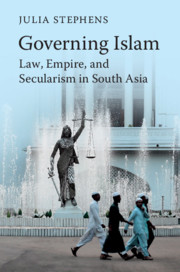
-
Select format
-
- Publisher:
- Cambridge University Press
- Publication date:
- 08 June 2018
- 21 June 2018
- ISBN:
- 9781316795477
- 9781107173910
- 9781316626283
- Dimensions:
- (228 x 152 mm)
- Weight & Pages:
- 0.5kg, 232 Pages
- Dimensions:
- (228 x 152 mm)
- Weight & Pages:
- 0.39kg, 232 Pages
- Subjects:
- Islam, Area Studies, South Asian History, Asian Studies, History, Religion
You may already have access via personal or institutional login- Subjects:
- Islam, Area Studies, South Asian History, Asian Studies, History, Religion
Book description
Governing Islam traces the colonial roots of contemporary struggles between Islam and secularism in India, Pakistan, and Bangladesh. The book uncovers the paradoxical workings of colonial laws that promised to separate secular and religious spheres, but instead fostered their vexed entanglement. It shows how religious laws governing families became embroiled with secular laws governing markets, and how calls to protect religious liberties clashed with freedom of the press. By following these interactions, Stephens asks us to reconsider where law is and what it is. Her narrative weaves between state courts, Islamic fatwas on ritual performance, and intimate marital disputes to reveal how deeply law penetrates everyday life. In her hands, law also serves many masters - from British officials to Islamic jurists to aggrieved Muslim wives. The resulting study shows how the neglected field of Muslim law in South Asia is essential to understanding current crises in global secularism.
Reviews
‘This book is nothing less than a landmark in its lucid, subtle, and persuasive arguments about the transformation of Islamic law in its encounter with colonial legal discourses and institutions. Basing herself on an archive of extraordinary breadth, Stephens revises old assumptions about Muslim law and about the consequences of colonial governance at every turn. This analysis of the past illuminates a present in urgent need of fresh understanding.'
Barbara D. Metcalf - University of California, Davis
‘Governing Islam is a masterful and compelling book that explores modern South Asia's Muslim legal history through ideas about religion, economy, gender, custom, colonialism, and socialism. Using primary sources in multiple languages, Julia Stephens reveals the many layers of law for Muslims. The result is simply superb - a fascinating portrait of vernacular, colonial, and post-colonial legal cultures, all intertwined and with plenty of intriguing twists.'
Mitra Sharafi - University of Wisconsin Law School
‘A major work of scholarship that brings together the history of law, religion and family in British India to tell the story of South Asian secularism. Erudite and sophisticated in tone this is a much-needed monograph at a time when the idea of secular India faces its gravest threat.'
Seema Alavi - University of Delhi, India
‘[Stephens’] analysis is convincing, not least because her writing is crisp and well-organized, [but] also because she repeats and summarizes her argument at each new vista, helping the reader grasp even her most subtle arguments … this book [is] a major contribution to the field of modern South Asian history and a useful one in the field of colonial legal history.’
Fareeha Khan Source: Islamic Law and Society
‘Governing Islam is an important addition to the disciplines of South Asian legal history, both for its important contributions to legal archival research during the British colonial period as well as for its study of Islamic economics.’
Daniel Waqar Source: Reading Religion
Contents
Metrics
Altmetric attention score
Full text views
Full text views help Loading metrics...
Loading metrics...
* Views captured on Cambridge Core between #date#. This data will be updated every 24 hours.
Usage data cannot currently be displayed.
Accessibility standard: Unknown
Why this information is here
This section outlines the accessibility features of this content - including support for screen readers, full keyboard navigation and high-contrast display options. This may not be relevant for you.
Accessibility Information
Accessibility compliance for the PDF of this book is currently unknown and may be updated in the future.


